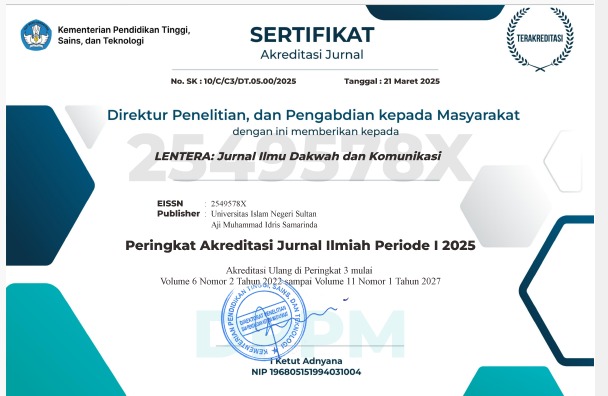Negotiation of National Identity of Teenager in the Context of Cyberspace in Border Territories of Indonesia-Malaysia
Abstract
Social media is a primary choice of teenagers today to present their existence. Social media can depict one’s life, however, it shows character restriction which can be used. Furthermore, the sociocultural conditions of teenagers also contribute to identity disclosure. Therefore, negotiation of identity can be a choice when they want to present themselves. Thus, this research was designed to describe the negotiation of national identity performed by teenagers, particularly those living in the border territories of Indonesia-Malaysia through their social media accounts. This research is a qualitative study using a method of documentation. By using documentation, the analysis was focused on the language aspect and any relevant contexts to teenagers’ national identity. Documentation was performed in a way by interpreting or construing any existing texts, for instance, a photo of a red-and-white flag uploaded on a post. The results of the study suggested that the main dynamics of their national identity emerged from symbolic communication with other people. Therefore, the characteristic of people living in a border territory also affects the negotiation of their national identity. For example, the use of the neighboring country flag is not necessarily a threat. This is associated with the socio-cultural condition of the border society which is unique and likely affecting their national identity. By understanding such uniqueness, negative perception can be avoided when perceiving the usage of the neighboring country’s symbols.
References
Amy Yau, Ben Marder, & Stephanie O’Donohoe. (2019). The role of social media in negotiating identity during the process of acculturation. Information Technology & People, 33(2), 554–575. https://doi.org/10.1108/ITP-09-2017-0305
Avi Marciano. (2014). Living the VirtuReal: Negotiating Transgender Identity in Cyberspace. Journal of Computer-Mediated Communication, 19(4), 824–838. https://doi.org/10.1111/jcc4.12081
Azmi Iik Firdhausi. (2017). Negosiasi identitas dalam interaksi sosial daring (dalam jaringan) melalui facebook: Studi kasus remaja Sekolah Kita Rumpin [Skripsi, Universitas Indonesia]. http://www.lontar.ui.ac.id/detail?id=20456429&lokasi=lokal
Digital in Indonesia: All the Statistics You Need in 2021. (2021). DataReportal – Global Digital Insights. https://datareportal.com/reports/digital-2021-indonesia
Gunawan Wibisono. (2019). Media Baru dan Nasionalisme Anak Muda: Pengaruh Penggunaan Media Sosial ‘Good News From Indonesia’ Terhadap Perilaku Nasionalisme. Jurnal Studi Pemuda, 6(2), 560. https://doi.org/10.22146/studipemudaugm.39264
Johny Eko Yulianto. (2017). STUDI KOMPARATIF IDENTITAS NASIONAL PADA REMAJA GENERASI Z DITINJAU DARI INTENSITAS PENGGUNAAN INTERNET. HUMANITAS, 13(2), 149. https://doi.org/10.26555/humanitas.v13i2.6070
Julia Khrebtan-Hoerhager. (2012, March). (Re-)Negotiating cultural identity though social media. Communiquer dans un monde de normes. L’information et la communication dans les enjeux contemporains de la " mondialisation "., France. https://hal.univ-lille.fr/hal-00840694
Klaus Schwab. (2019). Revolusi Industri Keempat (Farah Diena & Andi Tarigan, Trans.). Gramedia.
Larry A. Samovar, Richard R. Porter, McDaniel, & Erwin R. (2010). Communication Between Cultures (7th ed.). Cengage Learning.
Luke Amadi & James E. Agena. (2015). Globalization, Culture mutation and new identity: Implications for the Igbo cultural heritage. African Journal of History and Culture, 7(1), 16–27. https://doi.org/10.5897/AJHC2014.0212
Muhammad Wahyu Nugroho, Supriyono Supriyono, & Dadi Mulyadi Nugraha. (2021). PEMANFAATAN MEDIA SOSIAL TIK TOK SEBAGAI SARANA PENGUATAN IDENTITAS NASIONAL DI ERA PANDEMI. Academy of Education Journal, 12(2), 262–274. https://doi.org/10.47200/aoej.v12i2.695
Penghitung Karakter—Menghitung Jumlah Karakter. (2021). https://charactercalculator.com/id/
Robert A. Saunders. (2006). Denationalized digerati in the virtual near abroad: The internet’s paradoxical impact on national identity among minority Russians. Global Media and Communication, 2(1), 43–69. https://doi.org/10.1177/1742766506061816
Shuang Liu. (2015). Searching for a sense of place: Identity negotiation of Chinese immigrants. International Journal of Intercultural Relations, 46, 26–35. https://doi.org/10.1016/j.ijintrel.2015.03.020
Sitti Syahar Inayah. (2017). Konstruksi Nasionalisme Masyarakat Perbatasan Indonesia-Malaysia (Studi terhadap Masyarakat Desa Aji Kuning Kecamatan Sebatik Utara, Kabupaten Nunukan, Kalimantan Utara) [Disertation]. Universitas Indonesia.
Syifa Sarifah A & Ade Kusuma. (2016). Globalisasi sebagai Tantangan Identitas Nasional bagi Mahasiswa Surabaya. Jurnal Global & Policy, 4(2).
Yayuk Hidayah & Lisa Retnasari. (2019). TINJAUAN IDENTITAS NASIONAL DAN IDENTITAS KESUKUAN PADA MAHASISWA PGSD UAD YOGYAKARTA (STUDI KASUS MAHASISWA LUAR JAWA DI PGSD UAD). Muslim Heritage, 4(2), Article 2. https://doi.org/10.21154/muslimheritage.v4i2.1588
Yury M. Ershov. (2015). National Identity in New Media. Procedia - Social and Behavioral Sciences, 200, 206–209. https://doi.org/10.1016/j.sbspro.2015.08.053
Copyright (c) 2021 LENTERA

This work is licensed under a Creative Commons Attribution-ShareAlike 4.0 International License.
Penulis yang menerbitkan artikel di Lentera: Jurnal Ilmu Dakwah dan Komunikasi setuju dengan ketentuan berikut:
- Penulis memiliki hak cipta artikel dan memberikan hak jurnal untuk publikasi pertama dengan karya yang secara simultan dilisensikan di bawah CC-BY-SA atau The Creative Commons Attribution – ShareAlike Licence.
- Penulis dapat membuat perjanjian kontrak tambahan yang terpisah untuk distribusi non-eksklusif versi jurnal yang diterbitkan dari karya tersebut (misalnya, mempostingnya ke repositori institusional atau menerbitkannya dalam sebuah buku), dengan pengakuan atas publikasi awalnya di jurnal ini.
- Penulis diizinkan dan didorong untuk memposting pekerjaan mereka secara online (misalnya, dalam repositori institusional atau di situs web mereka) sebelum dan selama proses pengajuan, karena dapat menyebabkan pertukaran yang produktif, serta kutipan yang lebih awal dan lebih besar dari karya yang diterbitkan (Lihat The Effect of Open Access)
Authors who publish articles in Lentera: Jurnal Ilmu Dakwah dan Komunikasi agree to the following terms:
- Authors retain copyright of the article and grant the journal right of first publication with the work simultaneously licensed under a CC-BY-SA or The Creative Commons Attribution–ShareAlike License.
- Authors are able to enter into separate, additional contractual arrangements for the non-exclusive distribution of the journal's published version of the work (e.g., post it to an institutional repository or publish it in a book), with an acknowledgment of its initial publication in this journal.
- Authors are permitted and encouraged to post their work online (e.g., in institutional repositories or on their website) prior to and during the submission process, as it can lead to productive exchanges, as well as earlier and greater citation of published work (See The Effect of Open Access).












.png)
